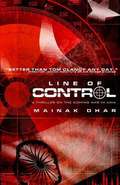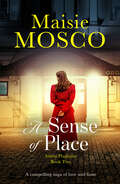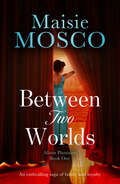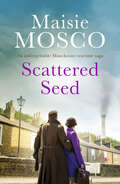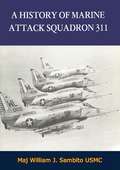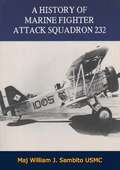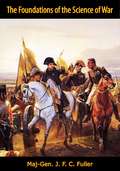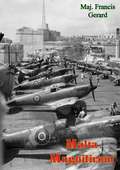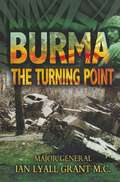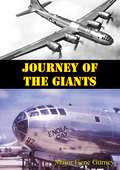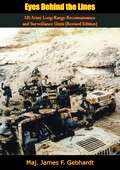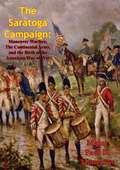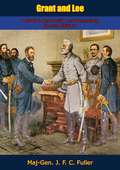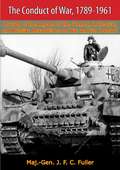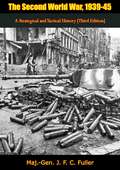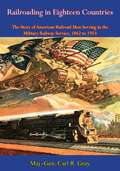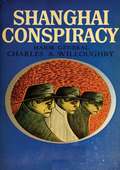- Table View
- List View
Line of Control A Thriller on the Coming War in Asia: A Thriller On The Coming War In Asia
by Mainak DharIt is 2012, and the world is a more dangerous place than ever before. Revolutions have swept aside one Middle Eastern regime after another. A regime allied to Al Qaeda has swept to power in Saudi Arabia, and uses its oil wealth and modern arsenal to further spread Jihad around the world. Yet another military coup brings a fundamentalist regime to power in Pakistan, which initiates an audacious plan to strike the first blow in this new global Jihad. As unprecedented terror attacks stun India, the stage is set for a conflict that brings the Indian subcontinent to the brink of a nuclear annihilation.
A Sense of Place (The Alison Plantaine Sagas)
by Maisie MoscoA successful Jewish stage actress in 1930s London finds love and sacrifice when she travels to pre-war Berlin in this heartwarming historical saga. The year is 1930, and Alison Plantaine is a star. She is thirty and in the full bloom of her stage career. But she is lonely, and for years, no man had been able to compete with the pace and intensity of her life. Only when she visits Berlin does she find a passion to rival the theatre. She falls madly in love with Richard Lindemann, who opens her eyes to what is happening around her. He shows her the dangers that may befall a nation under the grip of the Nazi regime. As Alison becomes involved in the concerns of those she cares for, she contemplates a world beyond the stage—a world that was moving faster and faster towards tragedy and war . . . A historical saga about love from a much-loved novelist, perfect for fans of Rita Bradshaw and Margaret Dickinson.Praise for the writing of Maisie Mosco&“Once in every generation or so a book comes along which lifts the curtain.&” —The Guardian&“Full of freshness and fascination.&” —Manchester Evening News &“The undisputed queen of her genre.&” —Jewish Chronicle
Between Two Worlds (The Alison Plantaine Sagas)
by Maisie MoscoA young girl is drawn to her dramatic family heritage in the first Alison Plantaine saga from the author of Almonds and Raisins. Alison Plantaine was born to the theatre. As a child the life she knew was one of backstage dramas and highly-charged emotions. The desire to perform is in her Plantaine blood. But when Alison learns about her secret heritage it makes her question the path she has chosen. Meanwhile, tastes are changing and the family passion for acting is losing touch with trends. A war is breaking out and Alison senses change in the air. Her mother is a gifted actress and wants her daughter to follow in her footsteps. Her father, shrewd and practical, understands that his daughter&’s respect for family tradition must not stifle her talent and the promise of success. But the decision must be Alison&’s and she becomes torn between duty and heritage, or the life she always dreamed of on the stage. A vivid and emotional family saga from a much-loved author, perfect for fans of Rita Bradshaw and Margaret Dickinson. Praise for the writing of Maisie Mosco &“Once in every generation or so a book comes along which lifts the curtain.&” —The Guardian &“Full of freshness and fascination.&” —Manchester Evening News &“The undisputed queen of her genre.&” —The Jewish Chronicle
Scattered Seed (Almonds and Raisins)
by Maisie MoscoDecades after fleeing hardships in Russia, a Jewish family faces troubles as Europe sits on the brink of World War II in this emotional saga. Thirty years have passed since the Sandberg family arrived in Manchester, penniless and bewildered, after fleeing certain death in Russia. Sarah and Abraham&’s children have forgotten the poverty and struggles of their youth, and their grandchildren have never known such hardship. But the prosperity that has come with their adopted country has brought other problems. Sons David and Nathan have to face the strains of their arranged marriages and feeling increasingly at odds with the mood of the nation. The year is 1935, and while Hitler rules in Germany the Fascists are marching in England . . . Can the Sandbergs keep hold of all they fought so hard for? The second book in the much-loved Almonds and Raisins series from international bestselling author Maisie Mosco, perfect for fans of Sheelagh Kelly and Jessica Stirling.Praise for the writing of Maisie Mosco&“Once in every generation or so a book comes along which lifts the curtain.&” —The Guardian&“Full of freshness and fascination.&” —Manchester Evening News&“The undisputed queen of her genre.&” —Jewish Chronicle
A Christmas Miracle for the Railway Girls: The festive, feel-good and romantic historical fiction book (The Railway Girls Series, 6) (The railway girls series #6)
by Maisie Thomas'Heartwarming historical fiction ... The perfect stocking filler for fans of Nancy Revell, Daisy Styles and Margaret Dickinson' Eastern Daily Press__________________The sixth heartwarming, feel-good instalment in the much-loved Railway Girls series!Manchester, 1942. There are surprises in store for the railway girls this festive season...When Cordelia's daughter Emily falls for a young chap who doesn't meet the approval of her father, Cordelia is reminded of her own first love - a love that she has never forgotten.Mabel is determined to get to the bottom of a spate of local burglaries. Her heart is in the right place as she sets out on a quest to clear her friend's name, but there will be unforeseen consequences.It's nothing short of a miracle when Colette returns to Manchester. But it's not going to be easy for her to keep living the life she once knew, and an impossible situation lies ahead.There will be more than one storm for the railway girls to weather but with the friendship and support of one another, there's hope that all will be well by Christmas...Readers LOVE the Railway Girls:'Make yourself a cuppa and find a comfy spot on the sofa because you are not going to be able to put this down''I simply cannot wait for the next one - I am hooked!''Gives a vivid picture of women's lives in wartime Manchester''Dramatic, intriguing and sprinkled with plenty of wit and heart''It's just like catching up with old friends'
Christmas Wishes for the Railway Girls: The new feel-good and festive WW2 historical fiction (The Railway Girls Series, 8)
by Maisie ThomasThe eighth, heartwarming instalment in the much-loved Railway Girls series!This will be a Christmas to remember for the railway girls. . .Little Max is growing day by day and Joan is adjusting to her new life. But in her heart of hearts, she is desperate to return to work on the railways.Margaret's job in the engine shed is demanding. But when a friend finds herself in crisis, she knows she must do everything she can to help her.Alison is overjoyed at the prospect of organising a Christmas wedding until a long-held secret is revealed. Knowing the truth, can she find the strength to forgive those she holds most dear?As war rages on, the railway girls must also battle with matters of the heart. Can they overcome their troubles in time for Christmas?Readers LOVE the Railway Girls:'Make yourself a cuppa and find a comfy spot on the sofa because you are not going to be able to put this down''I simply cannot wait for the next one - I am hooked!''Gives a vivid picture of women's lives in wartime Manchester''Dramatic, intriguing and sprinkled with plenty of wit and heart''It's just like catching up with old friends'
Christmas with the Railway Girls: The heartwarming historical fiction book to curl up with at Christmas (The railway girls series #4)
by Maisie Thomas'Heartwarming historical fiction ... The perfect stocking filler for fans of Nancy Revell, Daisy Styles and Margaret Dickinson' Eastern Daily Press___________________Manchester, 1941Christmas is the season for family and friends, and this year the railway girls will need each other more than ever.Cordelia appears to have the perfect life. When her daughter Emily arrives home unexpectedly, she can't wait to introduce her to her friends. But when things don't go to plan, Cordelia must decide where her loyalty lies.Things aren't going too smoothly for Alison either. Her beloved boyfriend has yet to propose, but there's a charity fundraiser dance and she's dressed up specially. Surely, tonight must be the night.Colette's friends are envious of her devoted husband; he meets her after every shift on the railway, and accompanies her around town. But Colette has a secret, one that will change her life - if only she knew who to confide in.With the festive season fast approaching, the railway girls are hoping for some Christmas magic... ___________________ Readers LOVE the Railway Girls:'Make yourself a cuppa and find a comfy spot on the sofa because you are not going to be able to put this down''I simply cannot wait for the next one - I am hooked!''Gives a vivid picture of women's lives in wartime Manchester''Dramatic, intriguing and sprinkled with plenty of wit and heart''It's just like catching up with old friends'
Hope for the Railway Girls: The fifth book in the feel-good, heartwarming WW2 historical saga series (The Railway Girls Series, 5) (The railway girls series #5)
by Maisie ThomasBeing a railway girl isn't always easy but together, they can overcome every challenge that stands in their way.___________________Manchester, 1942A new year brings renewed hope for the railway girls.Alison's romance with the charming Dr Maitland is blossoming, but then she is posted away from Manchester. Working in a canteen isn't part of her plan, nor is meeting her beau's old girlfriend - one who just happens to want him back.Margaret is supportive of her friend's new relationship until she realises exactly who he is. Torn between keeping her secret and warning Alison, she turns to Joan for help.Working in Lost Property would not be Joan's first choice of job, but with a baby on the way she knows she can't continue being a station porter. As she looks to the future, can she put the troubles of her past behind her?_______________________'The characters are fresh and stand out from the page, there is tension, pathos and heartbreak, but more than that, there is joy!' FROST MagazineReaders LOVE the Railway Girls:'Make yourself a cuppa and find a comfy spot on the sofa because you aren't going to be able to put this down''I simply cannot wait for the next one - I am hooked''Gives a vivid picture of women's lives in wartime Manchester''Dramatic, intriguing and sprinkled with plenty of wit and heart''It is just like catching up with old friends'
Secrets of the Railway Girls (The railway girls series #2)
by Maisie ThomasThe second novel in the uplifting railway girls series. Perfect for fans of Nancy Revell and Margaret Dickinson.--------------------------------- Manchester, November 1940As the war continues and secrets threaten the railway girls, they will discover the true meaning of friendship.---------------------------------For Dot, her job on the railways is everything. Transporting parcels around the country gives her pride that she is doing her bit for the war effort, but a growing friendship causes problems when home and work collide.Joan loves her boyfriend Bob dearly, but when tragedy strikes, her heart is torn apart, and she is forced to make a decision that could hurt those she loves most.Meanwhile Mabel has finally found a place to call home and her relationship seems to be going from strength to strength. However, the relentless bombing in the Christmas blitz is about to destroy everything she holds dear, and she will need her friends' courage and generosity now more than ever.Brought together by their work on Manchester's railways, the three women find that with the support and encouragement of each other, they can get through even the most challenging of times. --------------------------------- **Maisie's brand new novel THE RAILWAY GIRLS IN LOVE is available to pre-order now. Just search: 9781787463981** Readers LOVE the Railway Girls . . .'Beautifully written with a quiet charm' Jaffareadstoo 'Suberbly written . . . a gripping read' Ginger Book Geek 'Stunning . . . perfectly paced' Frost Magazine 'Poignant' Donna's Book Blog
The Railway Girls in Love (The railway girls series #3)
by Maisie ThomasThe brand new Railway Girls novel set in Manchester during WWII. Perfect for fans of Nancy Revell, Daisy Styles and Margaret Dickinson.___________________Readers LOVE the Railway Girls: 'Gripping and intriguing''Great story lines''Exceptional story . . . a must-read' 'Poignant''Emotional . . . strong women' ___________________Love is in the air, and together the railway girls can overcome even the hardest of times.Mabel has finally put the past behind her, and her relationship with the dashing Harry is stronger than ever. That is, until an old flame shows up, leaving Mabel questioning her future.Meanwhile Joan has made amends with Bob - if only she could do the same with Gran. And there's still that family mystery she wants answer to, isn't there?As a mother and grandmother, Dot Green has always put her family first. Her job as a parcels porter has brought new purpose to her life, so is it finally time to start following her heart . . .Life as a railway girl is busy but as war rages on and air raids disrupt daily life, the women realise they need each other more than ever, especially when there might be wedding bells on the horizon.
The Railway Girls: Their bond will see them through (The railway girls series #1)
by Maisie ThomasThe first novel in the wonderful new Railway Girls series, perfect for fans of Nancy Revell and Ellie Dean._____________________ 'Stunning writing [and] perfectly paced' Frost Magazine'A story of true friendship, love, loss and trust' Candis _____________________In February, 1922, at the western-most entrance to Victoria Station in Manchester, a massive plaque was unveiled. Beneath a vast tiled map showing the lines of the Lancashire and Yorkshire Railway network, a series of seven bronze panels recorded the names of the men of the Lancashire and Yorkshire Railway who gave their lives for King and Country in the Great War - a total of 1,460 names.In March, 1940, a group of women of varying ages and backgrounds, stand in front of the memorial, ready to do their bit in this new World War..._____________________Mabel is determined to make a fresh start as a railway girl where no one will know the terrible thing she did and she can put her guilt behind her... Or is she just running away?Meanwhile Joan will never be as good as her sister, or so her Gran keeps telling her. A new job as a station clerk could be just the thing she needs to forget her troubles at home.And Dot is further into her forties than she cares to admit. Her beloved sons are away fighting and her husband - well, the less said about him the better. Ratty old sod. She is anxious to become a railway girl just like her dear mam - anything to feel she is supporting the sons she prays for every night.The three women start off as strangers, but soon form an unbreakable bond that will get them through the toughest of times..._____________________ **Maisie's brand new novel THE RAILWAY GIRLS IN LOVE is available to pre-order now. Just search: 9781787463981**
A History of Marine Attack Squadron 311 (Marine Corps Squadron Histories Series)
by Maj William J. Sambito USMCIn this publication the history of Marine Attack 311 is traced from its commissioning in December 1942 through three wars and several evolutions during which the unit made the transition from a fighting squadron flying propeller-driven planes to a modern attack squadron equipped with high-performance jet aircraft. The history was prepared principally from primary sources such as command diaries and chronologies, published historical works, and recollections of Marines involved.Marine Attack Squadron 311 is one of many commands which were established during this rapid expansion in World War II. This squadron, originally commissioned as Marine Fighting Squadron 311, was born of war and baptized in the islands of the Pacific. It later met the challenge of Korea and carried forth its legend to Vietnam.
A History of Marine Fighter Attack Squadron 232 (Marine Corps Squadron Histories Series)
by Maj William J. Sambito USMCMarine Fighter Attack Squadron 312, the Checkerboard squadron, enjoys a fine reputation among Marine aviators. This volume, one of a new series of brief histories on famous aviation squadrons, is offered as a tribute to the pilots and crewmen who have contributed so significantly to Marine aviation. The history of Marine Fighter Attack Squadron 312 is a narrative account of the famed Checkerboard squadron in action. VMFA-312 saw its first action in the skies over Okinawa during World War II, and later the squadron was used extensively throughout the Korean conflict. The Checkerboards were one of the first Marine squadrons in Vietnam and today maintain their combat proficiency by constant training and hard work. VMFA-312 is a proud squadron with a rich and deep heritage and has passed along its traditions to the pilots and crewmen who presently fly Marine aircraft with the Checkerboard markings.
The Foundations of the Science of War
by Maj-Gen. J. F. C. FullerThe Foundations of the Science of War by Col. J. F. C. Fuller, first published in 1925, aims, as the title suggests and in the author’s own words, to provide “a foundation of the science of war, or, at least, of a science of war.” Col. Fuller spent over 15 years planning this foundation, and it was his endeavour that it would allow military students to examine it “not only for its own worth, but in order to think of war scientifically, for until we do so we shall never become true artists of war.” Likewise, Col. Fuller hoped the book may be of use to all other interested readers, “not only in studying war, but in studying any of the activities of life.”“In this book I am attempting something new—at least, new since the days of Henry Lloyd and Robert Jackson; for, as far as I am aware, these are my only two fellow-countrymen who have attempted to reduce war to a science. In a small way I am trying to do for war what Copernicus did for astronomy, Newton for physics, and Darwin for natural history. My book, I believe, is the first in which a writer has attempted to apply the method of science to the study of war; for Lloyd, Jackson, Clausewitz, Jomini, and Foch did not do this. In a few years’ time I hope that it will be superseded by many a better work, so that we all may begin to understand the nature of war, and thereby discover, not only how to prepare for war, but how to restrict its ravages; how to harness it, and possibly, also, how to transmute the destructive ferocity of the ape into the creative gentleness of the angel.”—Col. J. F. C. Fuller
Malta Magnificent
by Maj. Francis GerardMalta Magnificent, written by Major Francis Gerard and first published in 1943, tells of the siege of Malta, one of the epic incidents in the world's history. For two years, the Luftwaffe was hurled against the island day and night, but Malta and its people stood indomitable and unshaken throughout, and the "George Cross Island" held. A gripping account.
Burma: The Turning Point
by Maj. Gen. Ian Lyall GrantThe turning point of the war in Burma was the Imphal/Kohima campaign of 1944. For four months there was intense and savage fighting. The Japanese plan was to encircle and destroy the British and Indian positions before bursting into the plain and seizing Imphal. They failed in their first aim but the Japanese 15th Army prepared a final all-out thrust for Imphal. However, the British 4th Corps struck first and, after three weeks, the Japanese were virtually annihilated. This graphic account expertly analyses the campaign.
Journey of the Giants
by Maj. Gene GurneyThe story of the B-29 Superfort—the weapon that won the war in the Pacific.Major Gurney writes about B-29 operations in the Pacific, asserting that this aircraft was instrumental in forcing the Japanese to surrender.Much has been written about this great airplane, because any account of the devastating fire raids on Japan or of the dramatic beginnings of atomic warfare would be incomplete without telling the story of the B-29s which figured so prominently in these missions. But there is also an exciting story behind that story—the story of the giant bomber’s journey from the drawing boards of its designers to the day when out of the bomb bay of the “Enola Gay” tumbled the fantastic new weapon that, with a blinding flash and unprecedented power, brought about the dawn of the nuclear age. That is the story which Gene Gurney tells in Journey of the Giants, and he tells it well.The book ends with the historic scene on the battleship Missouri which signified the end of the war in the Pacific and, with it, the end of World War II. But while this was the climax in the B-29’s long journey, it was by no means its end. B-29s continued to serve a variety of important peacetime missions; they did their share in the development and testing of advanced nuclear weapons and, in the Korean War, added new battle honors to those gained in the Pacific.—Thomas S. Power, General, USAF, Commander in Chief, Strategic Air Command
Gold Swindle: The Story of Our Dwindling Gold
by Maj. George Racey JordanFirst published in 1959, this book by U.S. Army Air Corps Major George Racey Jordan tells of the loss of U.S. gold reserves under Franklin D. Roosevelt’s administration, when, in an effort to counter the deflation which was paralyzing the economy, Executive Order 6102 declared that all privately held gold of American citizens was to be sold to the U.S. Treasury and the price raised from $20 to $35 per ounce.In Gold Swindle: The Story of Our Dwindling Gold, Major Jordan discusses in detail the gold threat to national security, analyses the government’s power and sources thereof; describes the impending national crisis; and suggests steps to regain the U.S. citizens’ right to own and hold gold.
Eyes Behind the Lines: US Army Long-Range Reconnaissance and Surveillance Units [Revised Edition]
by Maj. James F. GebhardtEyes Behind the Lines: US Army Long-Range Reconnaissance and Surveillance Units is the 10th study in the Combat Studies Institute (CSI) Global War on Terrorism (GWOT) Occasional Paper series. This work is an outgrowth of concerns identified by the authors of On Point: The United States Army in Operation IRAQI FREEDOM. Specifically, these authors called into question the use of long-range surveillance (LRS) assets by commanders during that campaign and suggested an assessment ought to be made about their continuing utility and means of employment. This revision contains some important additional information the author received after this book was originally published.Major (Retired) James Gebhardt, of CSI, researched and wrote this Occasional Paper with that end in view. In this study, Gebhardt surveys the US Army s historical experience with LRRP and LRS units from the 1960s Cold War and Vietnam War, through their resurgence in the 1980s and use in Operations JUST CAUSE and DESERT STORM, to the advent of the GWOT. The paper's analytical framework examines each era of LRS units in terms of doctrine, organization, training, materiel, leadership, and personnel. In doing so, the author makes a strong case for continuing the LRS capability in the Army s force structure.The variety of environments and enemies likely to be faced by the military in the GWOT continues to demand the unique human intelligence abilities of trained and organized LRS units. As the Army leads the Armed Forces of the United States in combating terrorists where they live, the lessons found in this survey remain timely and relevant.
The Saratoga Campaign: Maneuver Warfare, the Continental Army, and the Birth of the American Way of War
by Maj. Paul D. MontanusThe Saratoga Campaign (June-October 1777) was a watershed event for the United States. The American conduct of the campaign is a textbook study in the application of the tenets of maneuver warfare principles at the operational and tactical levels. General Schuyler's brilliant shaping campaign against the British Forces as they advanced from Fort Ticonderoga to Albany forced General Burgoyne to detach elements of his force, which the Americans were able to isolate, mass forces against, and destroy. Ultimately, Schuyler's shaping cased the British campaign to culminate prior to the main engagements, known as the first and second battles of Saratoga. Occupying a prepared Defensive Position North of Saratoga, the Americans, led by General Arnold, conducted a forward oriented Defense that seized the initiative from the British and disrupted their preconceived plans. The American counter-attacks which demonstrated the American Mastery of seeking gaps and avoiding surfaces, attrited the British Force to such an extent that they were forced to surrender. The victory of the makeshift American Force over the Professional British-Led Force demonstrates the superiority of maneuver warfare versus Attritionist Techniques, and is of contemporary interest to the USMC.Richly illustrated throughout.
Grant and Lee: A Study in Personality and Generalship [Second Edition]
by Maj.-Gen J. F. C. FullerFirst published in 1957, this second edition of the analysis of the generalship of Ulysses S. Grant and Robert E. Lee remains one of the most readable histories of the Civil War. The author began his research sharing the generally held assumption that Lee was a great general and Grant a clumsy “butcher.” By the time Fuller completed his project, however, he regarded Grant as the greatest general of his age and one of the greatest strategists of any age. Grant and Lee is a compelling study not only of two remarkable men but also of the nature of leadership and command in wartime.“...cuts squarely across the accepted tradition...[Fuller] examines these two great soldiers from a fresh viewpoint and refuses to let himself be bound by tradition.”—Bruce Catton, New York Times Book Review“...a stimulating study which appreciates both the unique personalities of the protagonists and the social conditions which stamped their tactics.”—Commonweal“Fuller’s...analysis and comparison of the personality, leadership, and generalship of Grant and Lee is as readable, instructive, stimulating, and...controversial as when first published.”—Military Review
The Conduct of War, 1789-1961: A Study of the Impact of the French, Industrial, and Russian Revolutions on War and its Conduct
by Maj.-Gen J. F. C. Fuller“A tour de force in the way it embraces and weaves together the political, economic and military factors”—B. H. Liddell Hart“A work which sums up succinctly the learning of a life-time.”—New StatesmanThe Conduct of War, 1789-1961, which was originally published in 1961, is a study of the way in which political and economic changes since the French Revolution have altered both the techniques and the aims of war.The author begins by studying the limited wars that were possible in the age of absolute rulers, and the destructive impact of revolutionary and democratic government on this state of affairs. Not only did the new armies of the Napoleonic age grow immensely in size and military power: the aims for which the war was fought began to change.Now it is no longer a question of forcing the enemy government to change its policy in specific ways: the purpose is the destruction of that government and the absolute surrender of its people.Such a concept of war, the author contends, is a disastrous return to barbarism, and in this book he considers his study in the light of post-war events with Communist countries.
The Second World War, 1939-45: A Strategical and Tactical History [Third Edition]
by Maj.-Gen J. F. C. FullerBritish General J. F. C. Fuller is one of the greatest military thinkers of this century, and has been called the Clausewitz of our time. This book is Fuller’s direct and clear-eyed account of the most terrible war of the modern era. When first published in 1948, it received notices such as these:“The strategic and tactical phases of the war are brilliantly expounded...on that score, the book stands as probably the best comprehensive work on the war to appear so far.”—The New Yorker“The narrative, valuable as it is, is not the most important part of General Fuller’s book. What really matters is the author’s comments on the events he describes, and these provide us with a clear statement of what he thinks not only about particular operations but about the conduct of the war as a whole. The result is a hard-hitting politico-military pamphlet, in which none of the punches are pulled.”—The Spectator“[Fuller] knows how to handle a narrative full of incident; he is thoroughly at home in a subject in which he has kept himself up to date; and...he is one of the very rare original students of warfare whom this country has produced.”—Times Literary SupplementFuller’s biographer, Bryan Holden Reid, has described The Second World War as “an analysis of the breakdown, as Fuller saw it, of the vital relationship between grand strategy and grand tactics—the end and the means....Too often books on the Second World War detail the movements of formations about the battlefield and give space to strategical commentary without assessing the manner in which the war was actually fought. On the tactical level, The Second World War can still be read with profit.”Expertly combining detailed military history and analysis with Clausewitzian insights based on his own theories of warfare, Fuller produced a modern military masterpiece in The Second World War.
Railroading in Eighteen Countries: The Story of American Railroad Men Serving in the Military Railway Service, 1862 to 1953
by Maj.-Gen. Carl R. GrayThis is the story of the Military Railway Service of the United States Army from its beginning in 1862 and including a brief account of the Service in World War I. It is specifically the story of the military use of railroads in World War II and in Korea. General Gray has focused his comprehensive account on the performance of the personnel of the Service, and on outstanding individuals wherever possible. Out of more than 351,000 men and women employees of American railroads serving in all arms in World War II, 43,500 were assigned to various units of the Military Railway Service. This impressive record of their achievements covers history, organization, training and operations in Alaska, England, North Africa, Sicily and Italy, Northern France and Belgium, Southern France, Germany and Austria, Iran, India, the Philippines, New Caledonia, Australia, Japan and Korea.A notable feature of this handsome volume is the wealth of fine photographs of operations in all areas, for the most part photographs not seen before.
Shanghai Conspiracy: The Sorge Spy Ring, Moscow, Shanghai, Tokyo, San Francisco, New York
by Maj.-Gen. Charles A. WilloughbyOriginally published in 1952, General Willoughby's book Shanghai Conspiracy, which includes the story of Richard Sorge, is of the gravest importance because it presents a clear delineation of a worldwide pattern of Communist sabotage and betrayal which was still being practiced at the time of publication in 1952.During [the U.S.'s] Occupation of Japan, military intelligence exercised limited civil functions in collaboration with the modernized Japanese police, in an alert against national and foreign communism. The story of Richard Sorge, Soviet master spy, falls into this category of security surveillance. It represents a devastating example of a brilliant success of espionage--its evolution, techniques, and methods. Elements of this Soviet-inspired conspiracy actually ranged from China and Japan into the United States, in the period 1931-50.Over a period of years, there has been filed with Washington a most extensive documentation on the case, aggregating over a million words with hundreds of plates, photostats, and illustrations. Enormous efforts in translation and research have gone into it. It has been reviewed and authenticated by American lawyers, and is now being brought into focus by the Senate and House Committees on Internal Security and Un-American Activities.Sorge's story did not begin or end with Tokyo but was only a chip in the general mosaic of Soviet Far Eastern strategy. It deals with a sinister epoch in the history of modern China and must be viewed against the vicious background of world conspiracy. Shanghai was a vineyard of communism for men and women of many nationalities who had no conceivable personal stake in China, but an almost inexplicable fanaticism for an alien cause--the Communist subjugation of the Western world. Here were sown the dragon's teeth that have since ripened into the Red harvest of today.
